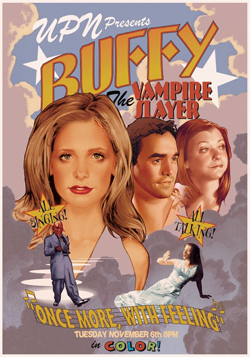
Back Once More, with Feeling Catalan Noch einmal mit Gefühl (Buffy) German Once More, with Feeling Spanish Vielä kerran tunteella Finnish Que le spectacle commence (Buffy) French Once More, with Feeling HE Once More, With Feeling Portuguese Once More, with Feeling Turkish
| "Once More, with Feeling" | |
|---|---|
| Buffy the Vampire Slayer episode | |
 Adam Hughes' poster for the episode included visual elements that highlighted its unique appearance, evoking an Old Hollywood feel also reflected in several pieces of music.[1] | |
| Episode no. | Season 6 Episode 7 |
| Directed by | Joss Whedon |
| Written by | Joss Whedon |
| Editing by | Lisa Lassek |
| Production code | 6ABB07 |
| Original air date | November 6, 2001 |
| Running time | 50 minutes |
| Guest appearances | |
| |
"Once More, with Feeling" is the seventh episode of the sixth season of the supernatural drama television series Buffy the Vampire Slayer (1997–2003), and the only one in the series that is a musical. It was written and directed by series creator Joss Whedon and originally aired on UPN in the United States on November 6, 2001.
"Once More, with Feeling" explores changes in the relationships of the main characters, using the plot device that a demon—credited as "Sweet" but unnamed in the episode—compels the people of Sunnydale to break into song at random moments to express hidden truths. The title of the episode comes from a line sung by Sweet; once the characters have revealed their truths and face the consequences of hearing each other's secrets, he challenges them to "say you're happy now, once more, with feeling". The musical format allowed characters to stay true to their natures while they struggled to overcome deceit and miscommunication, fitting with the sixth season's themes of growing up and facing difficulties in adulthood.[2][3]
All of the regular cast performed their own vocals, although two actors were given minimal singing at their request. "Once More, with Feeling" is the most technically complex episode in the series, as extra voice and dance training for the cast was interspersed with the production of four other Buffy episodes. It was Whedon's first attempt at writing music, and different styles—from 1950s sitcom theme music to rock opera—express the characters' secrets in specific ways. The episode received critical acclaim, particularly for the organic integration of the musical format and its humor and wit. It is considered one of the most effective and popular episodes of the series, and one of the best episodes of television. Prior to a financial dispute in 2007, it was shown in theaters with the audience invited to sing along.